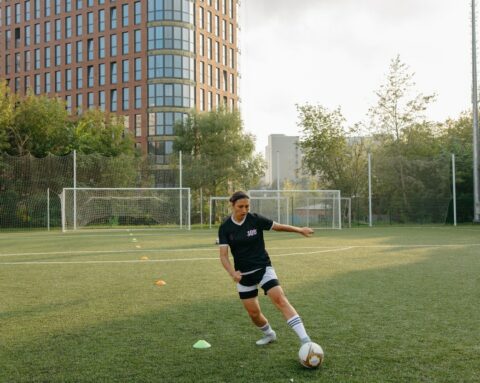The Meniscus Tear
Your meniscus is a shock absorber that allows our knees to absorb large amounts of force when active. By absorbing these forces your meniscus ensures that your bone surfaces are not damaged. Additionally, the meniscus is important for rotational stability of your knee. The meniscus separates the thigh bone from your shinbone and is commonly referred to as cartilage. The lateral meniscus and medial meniscus exist in all the knee joints.
As we increase our speed the meniscus works to disperse the force across all areas of the knee to prevent excess stress on isolated sections. In our younger years, it is common for the meniscus to tear due to twisting on a flexed knee. As we age the tear is more common to occur due to degeneration of the meniscus over time. When the meniscus tears due to a traumatic injury it is most commonly sports-related. When this occurs it is most often torn from anterior to posterior, however, it can tear radially. If the meniscus tear has occurred due to degeneration over time it is normal for surgery to be required to repair not only the meniscus but the joint surface.
Symptoms:
You may first notice torn meniscus symptoms when you experience popping, clicking or locking of the knee accompanied by a painful twist on a knee that is flexed. It is possible however for meniscus tears to occur slowly over time due to degeneration. It is normal to see swelling and feel tenderness along the knee joint line. Your doctor or myotherapist will be able to use clinical tests to aid with diagnosis.
Treatment:
The good news with a minor meniscus tear is that it will usually respond quite quickly to treatment. As your meniscus plays a major role in shock absorption, it has been proven that strengthening your leg muscles is a great way to reduce stress on both your muscle and bones as your knee begins to become more stable. The treatment program will not only reduce pain but also mobilise your joints and strengthen your knees. It will also minimise your chance of re-injury and improve your knee-cap alignment.
It is possible in certain situations for a meniscus tear to heal naturally. This is defined by whether the tear occurs in the red or white zone. These zones are named as such by whether blood is supplied to the area. The red zone has a blood supply which means that the meniscus tear there can heal naturally. If your meniscus tear does occur in the red zone, it will usually respond quickly to treatment by your myotherapist. The white zone does not and as a result, will heal naturally. Without a blood supply, your body is not able to trigger an inflammatory response and therefore will require surgery to remove the torn component.
Full recovery from a meniscus tear will differ on a case to case basis. If your tear has occurred in the red zone then it is expected to heal within 6-8 weeks. It is crucial to follow the advice of your myotherapist as any activities that prevent healing can have huge consequences and significantly delay your recovery. If your meniscus tear has occurred in the white zone then it is a much longer recovery period. Most doctors will recommend undergoing a period of rehabilitation before surgery with your myotherapist to strengthen your knee and better prepare you for post-surgery rehabilitation.
After surgery, your doctor will likely recommend you do not put weight on the affected knee for 4 to 8 weeks. Your treatment will be primarily focusing on mobilising the knee and strengthening the muscles around the area such as hamstrings and quadriceps.
Remember:
It is always best to avoid load-bearing activities such as walking on injuries such as meniscus tears that cause localised knee pain. In these situations, it is usually advisable to use crutches to avoid taking unnecessary pressure on the knee. However, there are some cases when the injury is less severe where you may be able to walk in straight lines on predictable surfaces. As always this should be evaluated by a trained myotherapist on a case by case basis!
If you are someone who tends to put off your trip to the myotherapist until the condition gets worse, it is wise to change your usual way of thinking when it comes to the meniscus tear! When untreated, the meniscus tear can commonly worsen and come loose from the knee joint. Your knee may give way or lock up and you may likely experience an increase in tear size of the meniscus.






